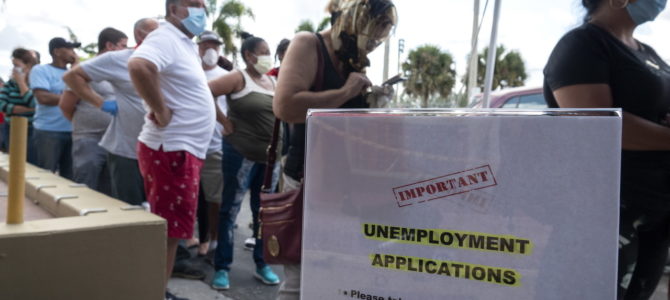New data from the Department of Labor released Thursday shows nearly 3 million Americans filed for first-time unemployment benefits last week as the economic toll over the novel Wuhan coronavirus begins to reach into its third month.
Thursday’s new numbers show more than 36 million have now filed jobless claims since state and local lockdowns became implemented in mid-March in an effort to curb the spread of the virus leading to an array of other consequences in the process including financial devastation and an escalating mental health crisis.
More than 36 million Americans have now filed unemployment claims over the past 8 weeks. https://t.co/KsQOWvNZGg pic.twitter.com/lyZKKhKQwM
— CNBC (@CNBC) May 14, 2020
While last week’s number of unemployment claims has dropped to the lowest in new filings since mid-March, the more than 2.9 million still far outpaces the previous record set for new claims in a single week in 1982 with 695,000. The April jobs report released Friday shows that within just two months the nation reached record levels of unemployment hitting 14.7 percent, a rate not seen since the Great Depression where economists estimate the country neared 25 percent that took several years to reach.
To confront surging jobless claims in March, Congress passed the Coronavirus Aid, Relief, and Economic Security (CARES) Act that beefed up federal unemployment benefits by $600 a week and established the Paycheck Protection Program (PPP) creating a relief fund for small businesses that allow employers to maintain staff on payroll. Congress’ radical expansion of unemployment insurance however, has only compounded the problem by making it far more profitable to rake cash from the government handout rather than stay onboard with an employer granted assistance under the PPP.
According to study from the conservative Heritage Foundation, Congress likely inflated unemployment claims by nearly 14 million by providing clear incentives to seek government assistance than remain with a full-time employer with increased benefits and relaxed eligibility requirements. The pair of Heritage researchers found that the median American worker earning less than $48,000 a year would take home 15 percent more on unemployment insurance than their pre-pandemic wages offered. Meanwhile, essential workers have seen no increase in pay.
While creating a win-win for employers and workers at the expense of the taxpayer, where firms enjoy the savings of forgoing staff wages for employees bringing in more money anyway, many small businesses are now finding trouble rehiring furloughed personnel to meet the provisions for PPP loans to be forgivable which require the same staff be brought back on payroll.
On Tuesday, House Democrats released their latest $3 trillion coronavirus stimulus bill the seeks to extend the increased unemployment benefits through the rest of the year. The ramped up assistance is currently set to expire in July.









